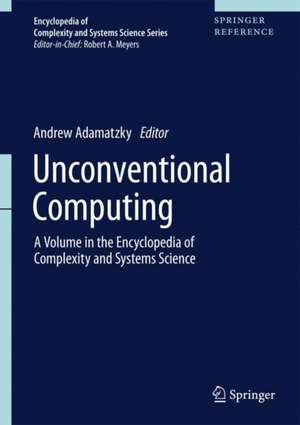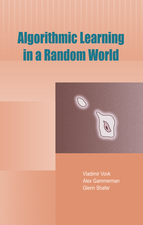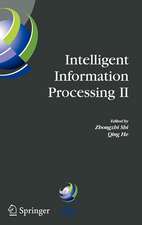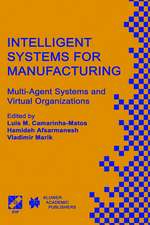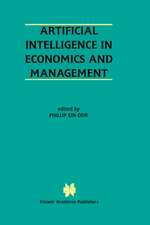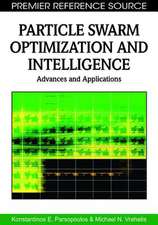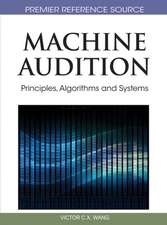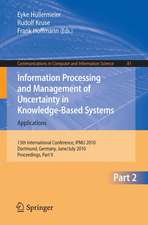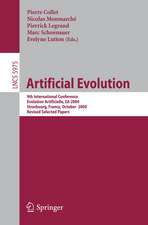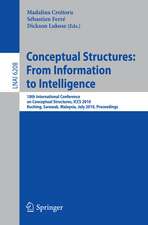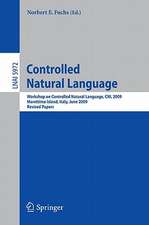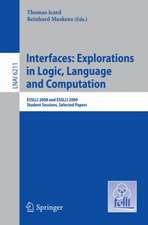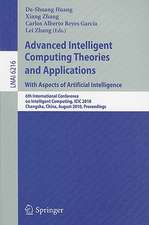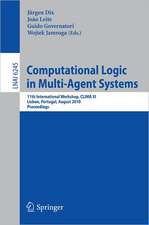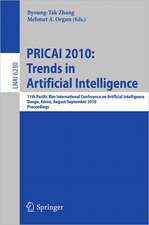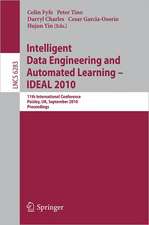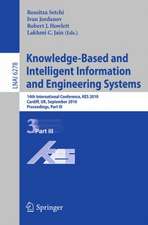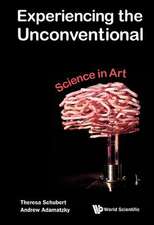Unconventional Computing: A Volume in the Encyclopedia of Complexity and Systems Science, Second Edition: Encyclopedia of Complexity and Systems Science Series
Editat de Andrew Adamatzkyen Limba Engleză Hardback – 26 aug 2018
Unconventional computing is a cross-breed of computer science, physics, mathematics, chemistry, electronic engineering, biology, materials science and nanotechnology. The aims are to uncover and exploit principles and mechanisms of information processing in, and functional properties of, physical, chemical and living systems, with the goal to develop efficient algorithms, design optimal architectures and manufacture working prototypes of future and emergent computing devices.
Preț: 2934.93 lei
Preț vechi: 3668.66 lei
-20% Nou
Puncte Express: 4402
Preț estimativ în valută:
561.58€ • 586.35$ • 464.79£
561.58€ • 586.35$ • 464.79£
Carte tipărită la comandă
Livrare economică 31 martie-07 aprilie
Preluare comenzi: 021 569.72.76
Specificații
ISBN-13: 9781493968824
ISBN-10: 1493968823
Pagini: 714
Ilustrații: XXVII, 693 p. 363 illus., 112 illus. in color.
Dimensiuni: 178 x 254 mm
Ediția:1st ed. 2018
Editura: Springer Us
Colecția Springer
Seria Encyclopedia of Complexity and Systems Science Series
Locul publicării:New York, NY, United States
ISBN-10: 1493968823
Pagini: 714
Ilustrații: XXVII, 693 p. 363 illus., 112 illus. in color.
Dimensiuni: 178 x 254 mm
Ediția:1st ed. 2018
Editura: Springer Us
Colecția Springer
Seria Encyclopedia of Complexity and Systems Science Series
Locul publicării:New York, NY, United States
Cuprins
Amorphous Computing.- Algorithmic Cognition.- Analog Computation.- Applications of P Systems.- Approximations to algorithmic probability.- Artificial Chemistry.- Bacterial Computing.- Biomolecular Data Structures.- Cellular Computing.- Computing with Solitons.- DNA Computing.- Evolution in Materio.- Grossone Infinity Computing.- Immune computing.- Inductive Turing Machines.- Mechanical Computing: The Computational Complexity of Physical Devices.- Membrane Computing, Power and Complexity.- Molecular Automata.- Nanocomputers.- Neuromorphic Computing based on Organic Memristive Systems.- Neuromorphic Photonics, Principles of.- Novel Hardware for Unconventional Computing.- Optical Computing.- Quantum Computing.- Reaction-Diffusion Computing.- Reversible Computing.- Slime Mould Computing.- Thermodynamics of Computation.- Unconventional Computing, Introduction to.- Metaheuristics.- Cuckoo Search.- Firefly Algorithm.- Sound and Music Computing.- Unconventional Computational Problems.- Enzyme-based computing.- Inductive Turing machines and complexity, super-recursive algorithms.- Reservoir computing, principles, and applications.- Collision-based computing.- Grossone Infinity Computing.- Unconventional Computational Problems.
Notă biografică
Andrew Adamatzky is a Professor in the department of Computer Science and Creative Technologies and Director of the Unconventional Computing Centre, University of the West of England. He has published extensively in theory of computation, cellular automata and mathematical machines, parallel computing, living technologies, organic electronics, and bio-inspired computing. He has authored several books, including Identification of Cellular Automata, Computing in Nonlinear Media, Reaction Diffusion Computers, Dynamics of Crowded Minds, Physarum Machines and edited over 25 collections of chapters. He is founding editor-in-chief of the Journal of Cellular Automata and Journal of Unconventional Computing and editor-in-chief of the International Journal of Parallel, Emergent and Distributed Systems, and Parallel Processing Letters.
Textul de pe ultima copertă
This volume of the Encyclopedia of Complexity and Systems Science, Second Edition, is a unique collection of concise overviews of state-of-art, theoretical and experimental findings, prepared by the world leaders in unconventional computing. Topics covered include bacterial computing, artificial chemistry, amorphous computing, computing with Solitons, evolution in materio, immune computing, mechanical computing, molecular automata, membrane computing, bio-inspired metaheuristics, reversible computing, sound and music computing, enzyme-based computing, structural machines, reservoir computing, infinity computing, biomolecular data structures, slime mold computing, nanocomputers, analog computers, DNA computing, novel hardware, thermodynamics of computation, and quantum and optical computing. Topics added to the second edition include: social algorithms, unconventional computational problems, enzyme-based computing, inductive Turing machines, reservoir computing, Grossone Infinity computing, slime mould computing, biomolecular data structures, parallelization of bio-inspired unconventional computing, and photonic computing.
Unconventional computing is a cross-breed of computer science, physics, mathematics, chemistry, electronic engineering, biology, materials science and nanotechnology. The aims are to uncover and exploit principles and mechanisms of information processing in, and functional properties of, physical, chemical and living systems, with the goal to develop efficient algorithms, design optimal architectures and manufacture working prototypes of future and emergent computing devices.
Caracteristici
Gathers unique contributions prepared by world leading experts in computer science, hardware, physics, chemistry, biology, nanotechnology, and engineering Extensively illustrated with many graphical examples Appeals to a broad audience of scientists, engineers, industry managers, and university students
